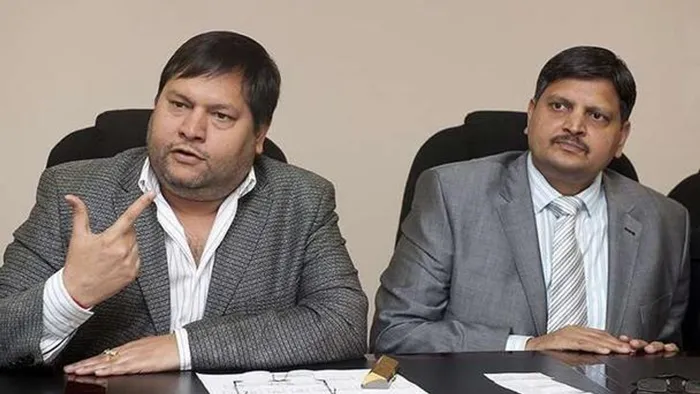The Guptas: Justice comes with a price

Picture: ANA File – Gupta brothers, Atul, right, and Ajay. Atul Gupta and another brother, Rajesh, will face trial in South Africa if they are extradited from the UAE, where they have been arrested. Minister in the Presidency, Mondli Gugunbele, says extraditing the brothers may take time and that there is no guarantee that the request for extradition will succeed.
By Zelna Jansen
The minister for Justice and Correctional Services has confirmed that an extradition request was submitted to the United Arab Emirates (UAE) Central Authority on July 25, 2022 for brothers, Rajesh, and Atul Gupta.
They were arrested on June 3, 2022 in the UAE and will face trial over procurement fraud involving R24 million that was paid by the Free State government to Nulane Investments. This company is owned and controlled by Iqbal Sharma, who has been reported to be a Gupta associate. Other charges include fraud, money laundering and corruption.
The trial is scheduled to start between 23 January 2023 and 3 March 2023. Minister in the Presidency, Mondli Gugunbele, emphasised that the process of extraditing the brothers may take time and that there is no guarantee that the request for extradition will succeed.
The minister’s reservations are spot on as extraditing the Gupta brothers or anyone else for that matter is a complicated process. It involves a state’s sovereignty as well as inter-state negotiations about allowing another state to remove a person from its jurisdiction.
Extradition can be explained as a process whereby one country surrenders a person to another country for the purposes of prosecution for crimes committed in that country. This is a complicated and lengthy process as it involves more than international relations.
In President of the Republic of South Africa v Quaglian, (2009), the constitutional court observed that the process of extradition involved three elements. These are:
acts of sovereignty on the part of two states;
a request by one state to another state for the delivery to it of an alleged criminal; and
the delivery of the person requested for the purposes of trial and sentencing in the territory of the requesting state.
There are functions and laws to be considered and complied with within the domestic laws of both states, as well as international law.
Domestically, the Extradition Act of 1962 sets out the procedure to be followed for extradition within South Africa’s borders.
No general duty exists in customary international law that would oblige states to surrender criminals. South Africa and UAE have an existing extradition treaty. Further, both the UAE and South Africa are signatories to the United Nations Convention Against Corruption.
The extradition request was made in terms of these international agreements. These agreements would also prescribe the offences for which extradition request can be granted and when it can be refused.
Most states agree to extradite an accused if the crime involved is punishable under the laws of both countries. According to the extradition treaty between UAE and South Africa, extradition will be granted in specified cases that include if the action is an offence in both countries punishable with imprisonment for a year or more, if the offence relates to taxation, exchange control, customs, or similar revenue matters.
On South Africa’s side, it has processed the request domestically in terms of the Extradition Act and sent it to the UAE in terms of the international agreements to which both states are party.
The UAE minister of justice will process South Africa’s request through establishing a specialised tribunal comprising of three judges to hear and rule on whether South Africa’s request on extradition will succeed. These hearings could be held in private.
Although these hearings are not criminal investigations or trials, the tribunal will determine whether there is sufficient evidence to warrant prosecution in South Africa of the Gupta brothers. South Africa’s evidence will therefore be scrutinised. The Gupta brothers are also likely to oppose the extradition request. They could raise a number of defences including human rights concerns and political crimes.
If the South African’s request succeeds, the brothers could appeal the decision. How long will the process of extraditing take? Looking back at the Shrien Dewani murder trial, it took more than two years for the extradition process to conclude. Dewani was accused of murdering his wife on November 13, 2010. Dewani left South Africa on November 16, 2010. Two accused were arrested and charges for carrying out the murder. On December 7, 2010, Dewani was arrested in Bristol under a South African warrant on suspicion of conspiring to murder his wife.
On December 8, 2010 he appeared before a Westminster’s magistrate for hearing on extradition requested by South Africa. Dewani subsequently suffered mental illness and post traumatic stress.
The extradition hearing began on May 3 to 5 2011 and August 10, 2011, South Africa succeeded with its extradition request. Dewani lodged a high court appeal against May’s decision on September 30, 2011. On July 2013, the extradition hearing began at Westminster Magistrate’s Court and on July 24, 2013, South Africa succeeded with its request to extradite Dewani.
An extradition process can therefore take anything from several months to a few years to conclude. One must also consider the cost of travelling of officials and external counsel, as well as the cost of external legal counsel in South Africa and abroad. Justice comes with a price.
Jansen is a lawyer and CEO of Zelna Jansen Consultancy.
This article is original to the The African. To republish, see terms and conditions.
Related Topics: